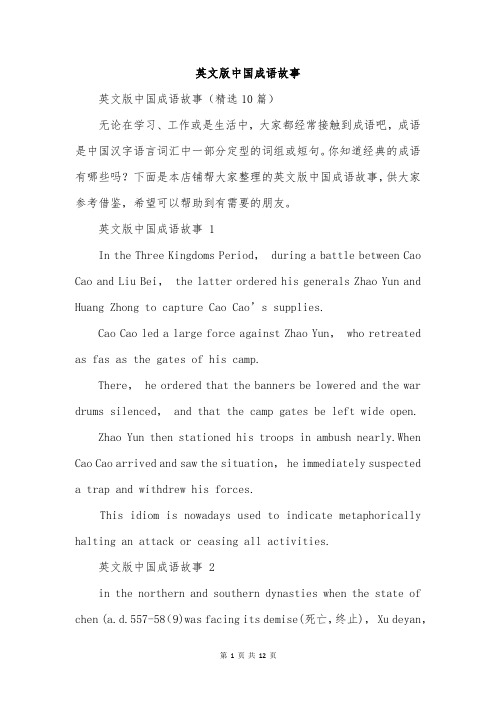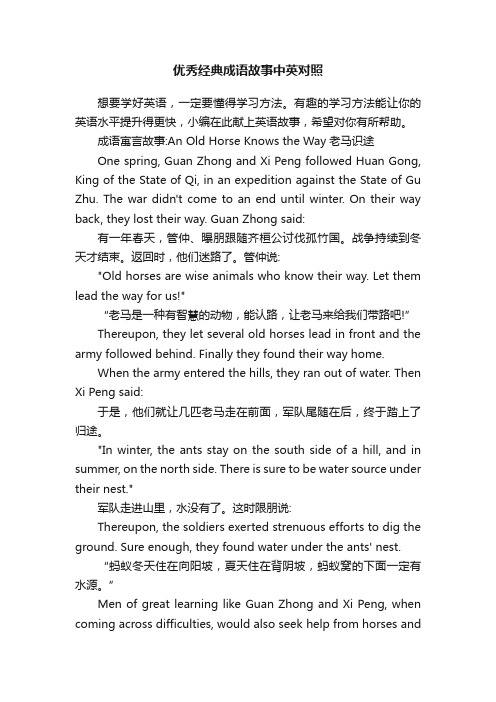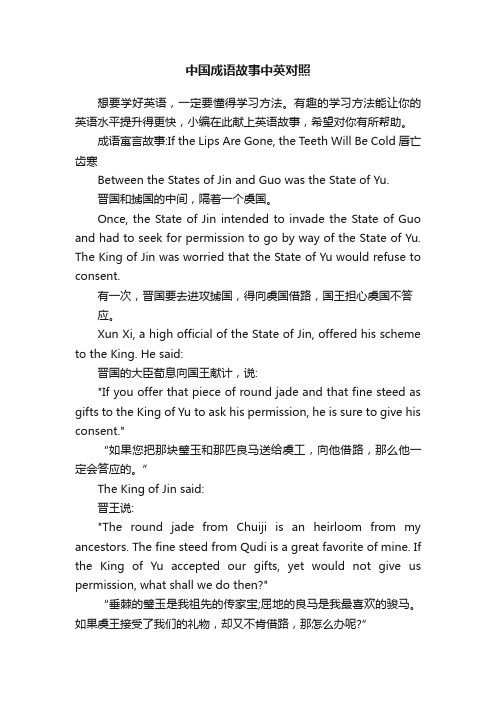成语故事的中英文版
中国传统成语故事(英文版)

10篇中国成语故事英文版,经典收藏!01 凿壁偷光Kuang Heng was born in a poor family. He liked reading books very much. He needed to work at daytime, so he had to read books during night. But he was too poor to buy acandle.One day, he found his neighbour had candles, but the light couldn’t go through his room.So he dug a small hole on the wall so that he could use the light to read books. From that day, he read books every night until the light went out.However, he finished reading all his books and there were no books for him to read.Then he went to a rich man’s house and worked for him without payment. The rich man asked: “ Why don’t you want the money?” Kuang Heng said: “ Because I only want toborrow your books.” The rich man agreed. Kuang Heng read the books one by one.Finally, he became a great scholar.匡衡勤奋好学,但家中没有蜡烛。
英文版中国成语故事

英文版中国成语故事英文版中国成语故事(精选10篇)无论在学习、工作或是生活中,大家都经常接触到成语吧,成语是中国汉字语言词汇中一部分定型的词组或短句。
你知道经典的成语有哪些吗?下面是本店铺帮大家整理的英文版中国成语故事,供大家参考借鉴,希望可以帮助到有需要的朋友。
英文版中国成语故事 1In the Three Kingdoms Period, during a battle between Cao Cao and Liu Bei, the latter ordered his generals Zhao Yun and Huang Zhong to capture Cao Cao’s supplies.Cao Cao led a large force against Zhao Yun, who retreated as fas as the gates of his camp.There, he ordered that the banners be lowered and the war drums silenced, and that the camp gates be left wide open.Zhao Yun then stationed his troops in ambush nearly.When Cao Cao arrived and saw the situation, he immediately suspected a trap and withdrew his forces.This idiom is nowadays used to indicate metaphorically halting an attack or ceasing all activities.英文版中国成语故事 2in the northern and southern dynasties when the state of chen (a.d.557-58(9)was facing its demise(死亡,终止), Xu deyan,husband of the princess, broke a bronze mirror into halves.each of them kept a half as tokens in case they were separated.soon afterwards, they did lose touch with each other,but the two halves of the mirror enabled them to be reunited.this idiom is used to refer to the reunion of a couple after they lose touch or break up.英文版中国成语故事 3during the warring states period (475-221bc), the king of the state of qi was very fond of listening to yu ensembles.he often got together 300 yu players to form a grand music.the king treated his musician very well.a man named nanguo heard about that and he managed to become a member of the band,even though he wan not good at playing the instrument at all.whenever the band played for the king, nanguo just stood in the line and pretended to play.nobody realized he was making no sound at all.as a result, he enjoyed his treatment just as the other musician did.when the king died, his son became the new ruler who also liked the music played on the yu.however,he preferred solos so that he ordered the musicians to play the yu one by one.therefore, nanguo had to run out of the palace.英文版中国成语故事 4At the end of the Qin Dynasty(221-206 B.C.)the State of Chu and the State of Han fought for control for the country.Xiang Yu, the king of Chu, was besieged(包围) at a place called GaiXia by the Han army led by Liu Bang.Xiang Yu was in a desperate situation,with little food and only a few soliders.At night, the surrounding Han troops started to sing Chu folk songs.Xiang Yu was very surprised at this,and said:"Has Liu Bang occupied the whole of Chu? How can he have drafted so many Chu people into his army?" Then he fled together with the remainder of his forces.This idiom is used metaphorically to mean to be in a helpless and critical situation, surrounded by the enemy on all sides.项羽和刘邦原来约定以鸿沟(在今河南荣县境贾鲁河)东西边作为界限,互不侵犯。
优秀经典成语故事中英对照

优秀经典成语故事中英对照想要学好英语,一定要懂得学习方法。
有趣的学习方法能让你的英语水平提升得更快,小编在此献上英语故事,希望对你有所帮助。
成语寓言故事:An Old Horse Knows the Way老马识途One spring, Guan Zhong and Xi Peng followed Huan Gong, King of the State of Qi, in an expedition against the State of Gu Zhu. The war didn't come to an end until winter. On their way back, they lost their way. Guan Zhong said:有一年春天,管仲、曝朋跟随齐桓公讨伐孤竹国。
战争持续到冬天才结束。
返回时,他们迷路了。
管仲说:"Old horses are wise animals who know their way. Let them lead the way for us!"“老马是一种有智慧的动物,能认路,让老马来给我们带路吧!”Thereupon, they let several old horses lead in front and the army followed behind. Finally they found their way home.When the army entered the hills, they ran out of water. Then Xi Peng said:于是,他们就让几匹老马走在前面,军队尾随在后,终于踏上了归途。
"In winter, the ants stay on the south side of a hill, and in summer, on the north side. There is sure to be water source under their nest."军队走进山里,水没有了。
中国成语故事中英对照

中国成语故事中英对照想要学好英语,一定要懂得学习方法。
有趣的学习方法能让你的英语水平提升得更快,小编在此献上英语故事,希望对你有所帮助。
成语寓言故事:If the Lips Are Gone, the Teeth Will Be Cold唇亡齿寒Between the States of Jin and Guo was the State of Yu.晋国和掳国的中间,隔着一个虞国。
Once, the State of Jin intended to invade the State of Guo and had to seek for permission to go by way of the State of Yu. The King of Jin was worried that the State of Yu would refuse to consent.有一次,晋国要去进攻掳国,得向虞国借路,国王担心虞国不答应。
Xun Xi, a high official of the State of Jin, offered his scheme to the King. He said:晋国的大臣荀息向国王献计,说:"If you offer that piece of round jade and that fine steed as gifts to the King of Yu to ask his permission, he is sure to give his consent."“如果您把那块璧玉和那匹良马送给虞工,向他借路,那么他一定会答应的。
”The King of Jin said:晋王说:"The round jade from Chuiji is an heirloom from my ancestors. The fine steed from Qudi is a great favorite of mine. If the King of Yu accepted our gifts, yet would not give us permission, what shall we do then?"“垂棘的璧玉是我祖先的传家宝;屈地的良马是我最喜欢的骏马。
成语故事(中英对照)

成语故事(中英对照)第一篇:成语故事(中英对照)抱薪救火战国末期,秦国向魏国接连发动大规模的进攻,魏国无力抵抗,大片土地都被秦军占领了。
到公元前273年,秦国又一次向魏国出兵,势头空前猛烈。
魏王把大臣们召来,愁眉苦脸地问大家有没有使秦国退兵的办法。
大臣们由于经过多年的战乱,提起打仗就吓得哆嗦,谁也不敢谈“抵抗”二字。
在这大兵压境的危急时刻,多数大臣都劝魏王,用黄河以北和太行山以南的大片土地为代价,向秦王求和。
谋士苏代听了这些话,很不以为然,忙上前对魏王说:“大王,他们是因为自己胆小怕死,才让您去卖国求和,根本不为国家着想。
您想,把大片土地割让给秦国虽然暂时满足了秦王的野心,但秦国的欲望是无止境的,只要魏国的土地没割完,秦军就不会停止进攻我们。
”说到这里,苏代讲了一个故事:从前有一个人,他的房子起火了,别人劝他快用水去浇灭大火,但他不听,偏抱起一捆柴草去救火,是因为他不懂得柴草不但不能灭火反而能助长火势的道理。
大王若同意拿着魏国土地去求和,不就等于抱着柴草救火吗?”尽管苏代讲得头头是道,但是胆小的魏王只顾眼前的太平,还是依大臣们的意见把魏国大片土地割让给秦国。
到公元225年,果然秦军又向魏国大举进攻,包围了国都大梁,掘开黄河大堤让洪水淹没了大梁城,魏国终于被秦国灭掉了。
故事出自《史记·魏世家》。
成语“抱薪救火”比喻用错误的方法去消灭祸害,结果反而使祸害扩大。
Carrying Faggots to Put Out a Fire In the last years of the Warring States period, the State of Qin attacked the State of Wei on a large scale repeatedly and occupied large areas of land, for the State of Wei was too weak to defend itself.In 273 B.B., the qinarmy launched another attack upon the State of Wei with a momentum more vigorous than ever.The king of the State of Wei summoned his officials,and asked with a worried look if anyone could propose a way to defeat the Qin army.After years of chaos caused by the wars,the officials trembled when fighting was mentioned, and no one dared to speak ofresistance.At the critical moment when a large enemy force was bearing down upon the border, most of the offinials persuaded the king to sue for peace, at the cost of giving away to the State of Qin the large area of land north of the Huanghe River and south of the Taihang Mountain.However Su Dai, a counsellor, did not agree.He hurried up to the king and said:“Your Majesty, they don't think about the interests of the country at all.It is just because they are cowardly and afraid of death that they ask you to sue for peace by betraying the country.Of course you can temperarily satisfy the ambition of the king of the State of Qin is insatiably greedy.It will never stop assaulting us until our land is totally given away.”Once there was a man w hose house was on fire.People told him to put out the fire with water, but he would not listen.Instead, he carried a faggot to put out the fire, only to make the fire fiercer.That was because he didn't know that,instead of putting out the fire, faggots could only make it burning more vigorously.Isn't it equivalent to carrying faggots to put out a fire if you agree to sue for peace at the cost of the land of the State of Wei?“Though Su Dai's argument was very convincing, the king accepted the suggestion of those officials and gave away to the State of Qin a large area of the land of the State of Wei.For the king of the State of Wei was cowardly and only cared for peace at the moment.As might be expected,the Qin army assaulted the State of Wei on a large scale in 225 B.C.,surroundingthe capital city Daliang and flooding it by digging open the dykes of the Huanghe River.The State of Wei was finally destroyed by the State of Qin.This story appears in the Historical Records Written by Sima Qian.The set phrase”car rying faggots to put out a fire"is used to mean adopting a wrong method to save a situation and ending up by making it worse.第二篇:中英对照彩图成语故事集锦中英对照彩图成语故事集锦一、中国古代成语故事 1.惊弓之鸟Birds Startled by the Mere Twang of a Bowstring战国时期(公元前403―221年中国中原地区各诸侯国连年争战的时代)魏国有个名叫更羸的人。
中国成语故事中英文对照阅读版

中国成语故事中英文对照阅读版中国的成语博大精深,这也可以从侧面中看出我国古代的文化真的是源远流长,影响潜移默化。
今天为大家奉上中国成语英语故事,时间难得,何不深入了解一下让自己的收获更多呢?中国成语英语故事(一)come out of nowhere一鸣惊人In the Warring States Period(战国), Duke Wei of Qi neglectedstate affairs, for the first three years of his reign, giving himself over to dissipation.战国时期,齐威王继承王位已有三年了,可是他整天饮酒作乐,不理朝政。
One of his minister, Chun Yukun(chn y kūn)who had a good senseof humor, said to him:”There is a big bird which has never taken wing nor sung for three years.Your Highness, may you guess what kind of bird is it?”有一个大臣叫淳于髡,很有幽默感,对齐威王说:“臣听说齐国有一只大鸟,三年来不飞也不叫,大王知道这是一只什么鸟?”The dukeanswered, “Once that bird starts to fly and sing, it will astonishthe world.”(其实淳于髡是暗喻齐威王)齐威王答道:“一旦这只鸟开始飞翔高歌,必然震惊世界。
”The duke then devoted himself to his duties and built his state up into a powerfulone.从此齐威王勤于朝政,励精图治,国威大振。
This idiom is used to indicate that a personmay rise from obscurityand achievegreatness.成语“一鸣惊人”比喻平时默默无闻或是无所作为,但一旦认真起来,便一下子干出一番惊人的事来。
关于中英文成语故事三篇
关于中英文成语故事三篇【惊弓之鸟】In the Warring States Period, there was a man in theState of Wei called Geng Lei. One day he said to the king:'I can shoot down birds by simply plucking my bowstring.' When the king expressed doubt, Geng Lei pointed his bow at a wild goose flying in the sky, twanged the bowstring, and the goose fell to the ground. Geng Lei said, 'This goose has been hurt in the past. Hearing the twang of the bowstring, it assumed that it was doomed. So it simply gave up trying to live.战国时期(公元前403―221年中国中原地区各诸侯国连年争战的时代)魏国有个名叫更羸的人。
一天,他对国王说:“我只要拉开弓,空射一下,就能把天上的鸟射下来。
”国王不相信。
更羸便对准天上飞来的一只雁射去,果真那只雁听到拉弦的声音就掉了下来。
国王感到很惊奇。
更羸说,“那是一只受过伤的雁。
它一听到我拉开弓弦的声响,就惊慌得支持不住,自然要掉下来了。
”This idiom means that if one has been frightened in the past one's will may become paralysed in a similar situation.“惊弓之鸟”这个成语比喻受过惊恐之后,有一点动静就特别可怕。
成语故事:雕虫小技(中英文版)
A nI n s i g n i f i c a n t S k i l l “雕虫”最早见于西汉扬雄的《法言·吾子》,后唐代李延寿在《北史·李浑传》、李白在《与韩荆州书》均有“雕虫小技”的用法。
“雕虫小技”比喻微不足道的技能(多指文字技巧)。
During the Tang Dynasty, there was a man named Han Chaozong. During his tenure as an official, Han Chaozong liked to 1)promote young 2)talents and earned everyone’s respect. One day, a young man named Li Bai wrote a letter to Han Chaozong, in hopes of gaining his 3)recommendation . At the end of the letter, Li Bai wrote, “My 4)minor skills may not match your great expectations.” It implies that his writing might not be too significant for someone of Han’s stature to appreciate.雕虫小技1) promote v. 提升2) talent n. 人才在唐代,有一个名叫韩朝宗的人。
他任官时喜欢提拔后进,大家都非常尊敬他。
一天,一个名叫李白的年轻人给韩朝宗写了一封信,希望得到他的举荐。
在信的最后李白写道:“恐雕虫小技,不合大人。
”意思是说,恐怕他写的文章只是一些微不足道的小伎俩,不够让韩朝宗这样有名望的人欣赏。
Li Bai was very bad at writing poetry.参考答案:F3) recommendation n. 推荐4) minor adj. 微小的。
中英文成语故事精选三篇
【导语】孩⼦们在学习语⽂的过程中,肯定会学习到成语,成语就是⽤最简短的语⾔,表达最深刻的意思。
下⾯是®⽆忧考⽹分享的中英⽂成语故事精选三篇。
欢迎阅读参考! 【南辕北辙】 Once a man wanted to go to the south, but his carriage was heading north. A passer-by asked him: “If you are going to the south, why is your chariot heading north? ” The man answered, “My horse is good at running, my driver is highly skilled at driving a carriage, and I have enough money. ” The man didn't consider that the direction might be wrong; the better his conditions were, the further he was away from his destination. 从前有个⼈要到南⽅去,他坐的车⼦却向北⽅⾏驶。
过路⼈说:“你去南⽅,车⼦怎么向北⾏驶呢?”他回答说:“我的马很能跑路,我的车夫驾车的技术也很⾼明,加上我⼜带了充⾜的路费。
”这个⼈没有考虑到,⽅向弄反了,他的条件越好,离他要去的地⽅就越远。
The idiom derived from this story indicates that one's action was the opposite effect to one's intention. 后来⼈们就把这个故事概括为“南辕北辙”,⽐喻⼀个⼈的⾏为和他的⽬的正好相反。
【卧薪尝胆】 During the Spring and Autumn period (770-476BC), the State of Wu launched an attack against the State of Yue. The King of Wu was seriously wounded and soon died. His son Fu Chai became the new King. Fu was determined to get revenge. He drilled his army rigidly until it was a perfect fighting force. Three years later, he led his army against the State of Yue and caught its king Gou Jian. Fu took him to the State of Wu. 春秋时期,吴国和越国之间进⾏了⼀场战争,吴王不幸受了重伤,不久就死了。
英文成语故事附翻译
英文成语故事附翻译英文成语故事附翻译(通用13篇)故事是一种文学体裁,生动的,美妙的故事可以帮你认识社会、理解人生,引导你做一个通达事理、明辨是非的人。
下面是小编帮大家整理的英文成语故事附翻译,供大家参考借鉴,希望可以帮助到你。
英文成语故事附翻译篇1During the Spring and Autumn Period (770-476 BC), prince Zhou Xu of the State of Wei killed his brother and became the new emperor. Zhou Xu was a tyrant. He oppressed his people and indulged in wars of agGREssion. By launching wars, he tried to divert the peoples attention and reduce their discontent with him in order to consolidate his dictatorship.The Duke of the State of Lu leant about Zhou Xus usurpation of state power and his ambitious plan, he asked a senior official, "What do you think about Zhou Xus move? "The official answered, "He indulges in wars , bringing his people much disaster. He wont get their support. And hes capricious, so few of his close friends follow him. He can never achieve his success. In addition, war is like fire. If one launches wars endlessly without restraint, hell eventually burn himself. "Sure enough, the people of Wei with the help of the State of Chen overthrew Zhou Xu and killed him in less than a year.Later, people use it to mean that those who do evil will finally ruin themselves.春秋时期,卫国的王子州吁杀死了他的哥哥卫桓公,成为了卫国的国君。
- 1、下载文档前请自行甄别文档内容的完整性,平台不提供额外的编辑、内容补充、找答案等附加服务。
- 2、"仅部分预览"的文档,不可在线预览部分如存在完整性等问题,可反馈申请退款(可完整预览的文档不适用该条件!)。
- 3、如文档侵犯您的权益,请联系客服反馈,我们会尽快为您处理(人工客服工作时间:9:00-18:30)。
成语故事的中英文版
During the Spring and Autumn Period (770-476 BC), prince Zhou Xu of the State of Wei killed his brother and became the new emperor. Zhou Xu was a tyrant. He oppressed his people and indulged in wars of agGREssion. By launching wars, he tried to divert the people's attention and reduce their discontent with him in order to consolidate his dictatorship.
The Duke of the State of Lu leant about Zhou Xu's usurpation of state power and his ambitious plan, he asked a senior official, "What do you think about Zhou Xu's move? "The official answered, "He indulges in wars , bringing his people much disaster. He won't get their support. And he's capricious, so few of his close friends follow him. He can never achieve his success. In addition, war is like fire. If one launches wars endlessly without restraint, he'll eventually burn himself. "
Sure enough, the people of Wei with the help of the State of Chen overthrew Zhou Xu and killed him in less than a year.
Later, people use it to mean that those who do evil will finally ruin themselves.
春秋时期,卫国的王子州吁杀死了他的哥哥卫桓公,成为了卫国的国君。
州吁是个暴君,他压迫百姓,到处侵略别的国家。
他想利用战争来分散百姓的注意力,减少人们对他的不满,巩固他的专政。
鲁国的君王知道州吁篡夺了王位,还想吞并其他国家,就问他手下的一名官员:"你认为州吁的目的能达到吗?"那位官员说道:"州吁到处打仗,给人民来了灾难。
人民不会支持他。
他这个人又反复无常,身边没有什么亲信。
他不可能实现自己的野心。
而且,战争就象火。
无休止地打仗,最后,火会烧到自己身上。
"
果然,不到一年,卫国人民就在陈国的帮助下推翻了州吁的统治,并处死了他。
后来,人们用这个成语来比喻干害人的勾当,最后受害的还是自己。
